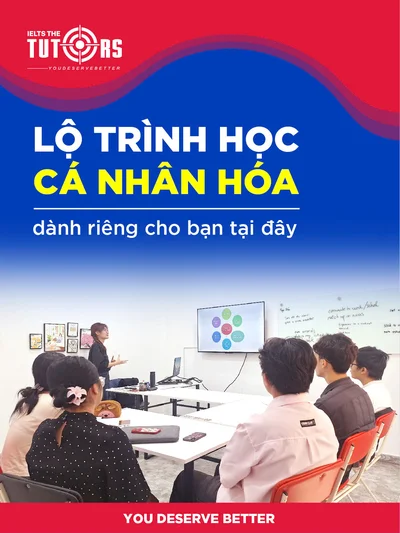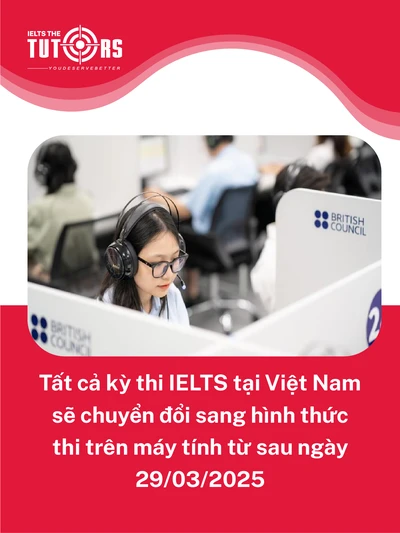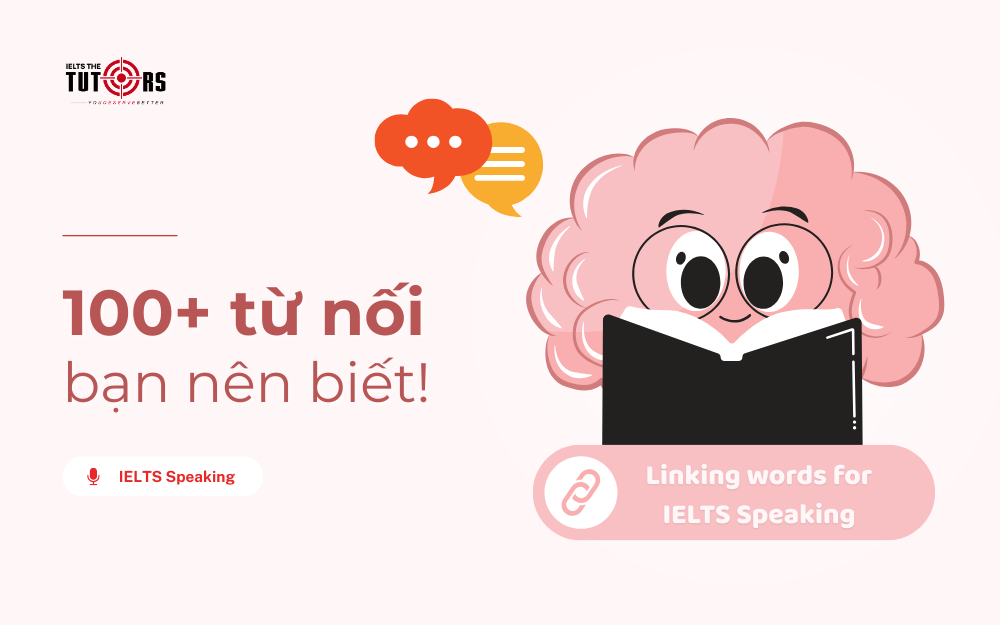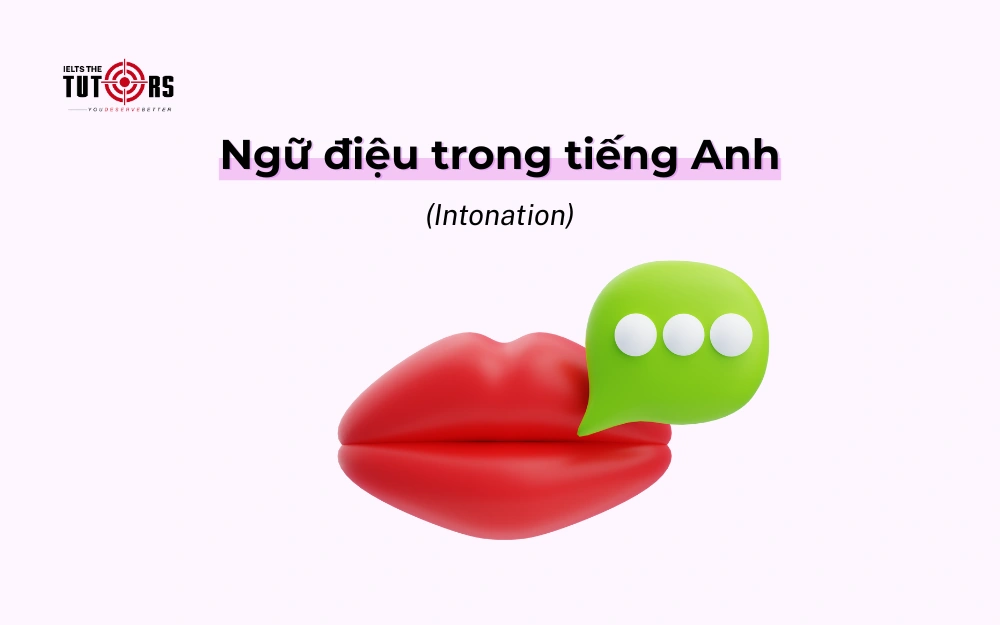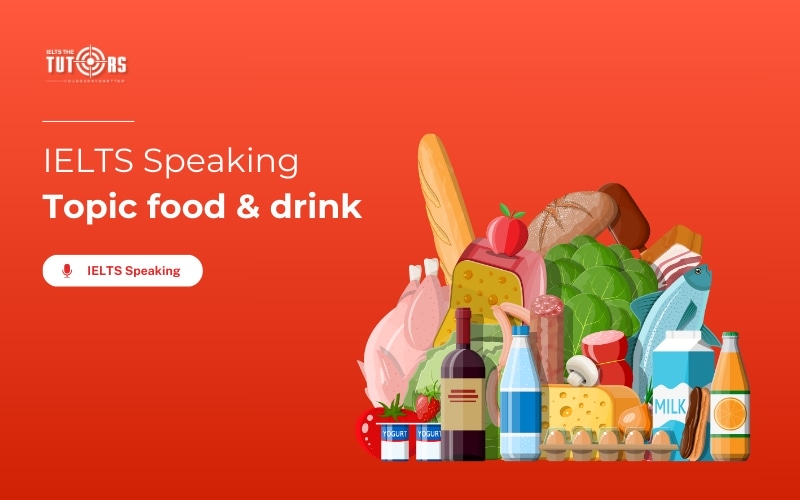
Đồ ăn và thức uống là chủ đề không chỉ quen thuộc trong cuộc sống hàng ngày mà còn thường xuyên xuất hiện trong kỳ thi IELTS. Cùng giải mã IELTS Speaking topic food and drink part 1, 2, 3 với từ vựng và bài mẫu điểm cao ngay trong bài viết này, theo dõi nhé!
| Key takeaways |
| Từ vựng thông dụng
Cuisine, Ingredient, Appetizer, Dessert, Beverage, Nutritious, Savory, … Collocations Balanced diet, Junk food, Home-cooked meal, … Idioms A piece of cake, Spill the beans, Eat like a bird, … Part 1
Part 2
Part 3
|
Từ vựng IELTS Speaking topic Food and Drink
Mặc dù là chủ đề khá gần gũi, tuy nhiên số lượng từ vựng trong topic Food and Drink cực kỳ nhiều, điều này đòi hỏi thí sinh cần phải có sự chuẩn bị thật kỹ trước khi bước vào phòng thi.
Từ vựng thông dụng IELTS Speaking topic Food and Drink
|
Từ vựng |
Phiên âm |
Loại từ |
Ý nghĩa |
|
Cuisine |
/kwɪˈziːn/ |
noun |
Ẩm thực |
|
Ingredient |
/ɪnˈɡriːdiənt/ |
noun |
Nguyên liệu |
|
Appetizer |
/ˈæpɪtaɪzər/ |
noun |
Món khai vị |
|
Dessert |
/dɪˈzɜːrt/ |
noun |
Món tráng miệng |
|
Beverage |
/ˈbevərɪdʒ/ |
noun |
Đồ uống |
|
Nutritious |
/njuːˈtrɪʃəs/ |
adjective |
Giàu dinh dưỡng |
|
Savory |
/ˈseɪvəri/ |
adjective |
Thơm ngon (thường là đồ mặn) |
|
Processed |
/ˈprɑːsest/ |
adjective |
Chế biến sẵn |
|
Fussy eater = picky eater |
/ˈfʌs.i/ /ˈiː.tər/ |
noun |
người kén ăn |
|
Devour |
/dɪˈvaʊər/ |
verb |
Ăn ngấu nghiến |
|
Season |
/ˈsiːzən/ |
verb |
Nêm nếm |
|
Indulge in |
/ɪnˈdʌldʒ ɪn/ |
verb |
Tận hưởng |
|
Prepare |
/prɪˈpeər/ |
verb |
Chuẩn bị |
Collocations topic Food and Drink
|
Collocation |
Phiên âm |
Ý nghĩa |
|
Balanced diet |
/ˈbælənst ˈdaɪət/ |
Chế độ ăn cân bằng |
|
Junk food |
/dʒʌŋk fuːd/ |
Đồ ăn nhanh (không lành mạnh) |
|
Home-cooked meal |
/hoʊm kʊkt miːl/ |
Bữa ăn nấu tại nhà |
|
Fast food |
/fæst fuːd/ |
Đồ ăn nhanh |
|
Exotic cuisine |
/ɪɡˈzɒtɪk kwɪˈziːn/ |
Ẩm thực lạ, độc đáo |
|
Fresh ingredients |
/frɛʃ ɪnˈɡriːdiənts/ |
Nguyên liệu tươi |
|
Hearty breakfast |
/ˈhɑːrti ˈbrɛkfəst/ |
Bữa sáng đầy đủ |
|
Food poisoning |
/fuːd ˈpɔɪzənɪŋ/ |
Ngộ độc thực phẩm |
Idioms topic Food and Drink
|
Idiom |
Ý nghĩa |
Định nghĩa |
|
A piece of cake |
Rất dễ |
Something very easy to do |
|
Spill the beans |
Tiết lộ bí mật |
To reveal a secret |
|
Eat like a bird |
Ăn rất ít |
To eat very little |
|
Eat like a horse |
Ăn rất nhiều |
To eat a lot |
|
Bite off more than you can chew |
Cắn quá khả năng |
To take on a task that is too big or difficult |
|
Food for thought |
Điều đáng sức suy nghĩ |
Something that makes you think seriously |
|
Have a sweet tooth |
Thích đồ ngọt |
To love eating sugary foods |
|
Make one’s mouth water |
Khiến ai ảo thèm |
To make someone feel very hungry or excited |
Xem thêm: Từ vựng chủ đề nấu ăn trong tiếng Anh
IELTS Speaking topic food and drink part 1
Question 1: What is your favorite food?
My favorite food has to be sushi. I’m absolutely fascinated by the delicate combination of flavors, especially the freshness of the raw fish paired with the slightly tangy rice. Sushi is not only delicious but also visually appealing, and I enjoy the variety it offers, from simple nigiri to elaborate rolls. It’s something I never get tired of eating.
Vocabulary:
- Delicate (adj): tinh tế
- Tangy (adj): chua nhẹ nhàng
- Visually appealing (adj phrase): hấp dẫn về mặt thị
- Nigiri (noun): sushi nắm
- Elaborate (adj): cầu kỳ, tỉ mỉ
Question 2: What is a traditional dish in your country?
In Vietnam, pho is undoubtedly one of the most iconic traditional dishes. It’s a flavorful noodle soup that usually consists of a savory broth, rice noodles, and either beef or chicken. The dish is often garnished with fresh herbs like cilantro and green onions, which add a refreshing touch. Pho is not just food; it’s a cultural symbol that represents Vietnamese cuisine worldwide.
Vocabulary:
- Iconic (adj): mang tính biểu tượng
- Flavorful (adj): đậm đà
- Savory (adj): mặn mà, ngon
- Garnish (verb): trang trí, tăng hương vị
- Cultural symbol (noun phrase): biểu tượng văn hóa
Question 3: Do you think your diet is healthy? Why or why not?
I’d say my diet is relatively healthy because I try to include a balance of nutrients in my meals. For example, I make an effort to eat plenty of vegetables and fruits, along with lean proteins and whole grains. However, I have a bit of a sweet tooth, so I occasionally indulge in desserts. Overall, I believe moderation is key to maintaining a healthy lifestyle.
Vocabulary:
- Relatively (adv): tương đối
- Nutrients (noun): chất dinh dưỡng
- Lean proteins (noun phrase): protein nạc
- Whole grains (noun phrase): ngũ cốc nguyên hạt
- Sweet tooth (noun): thích đồ ngọt
- Moderation (noun): sự điều độ
Question 4: Do you like tasting new food?
Absolutely! I find trying new dishes to be an exciting way to explore different cultures and broaden my horizons. It’s always interesting to experience unique flavors and cooking techniques that are completely different from what I’m used to. For instance, I recently tried Moroccan tagine, and I was blown away by the rich spices and slow-cooked textures.
Vocabulary:
- Exciting (adj): hào hứng, thú vị
- Broaden my horizons (phrase): mở mang hiểu biết
- Unique (adj): độc đáo
- Cooking techniques (noun phrase): kỹ thuật nấu nướng
- Blown away (idiom): rất ấn tượng
- Rich spices (noun phrase): gia vị đậm đà
Question 5: Do you prefer home-cooked meals or dining out? Why?
I definitely prefer home-cooked meals because they are generally healthier and more cost-effective. Preparing meals at home allows me to have full control over the ingredients and cooking methods. That said, I do enjoy dining out occasionally, especially when I’m craving something special or celebrating a special occasion with friends and family.
Vocabulary:
- Cost-effective (adj): tiết kiệm chi phí
- Have full control over (phrase): kiểm soát hoàn toàn
- Craving (verb): khao khát, thèm
- Special occasion (noun phrase): dịp đặc biệt
- Celebrating (verb): kỷ niệm
Question 6: Do you prefer eating out or cooking at home?
I prefer cooking at home because I enjoy experimenting with different recipes and ingredients. Plus, it’s usually healthier and more cost-effective than eating out.
Vocabulary:
- experimenting (verb): thử nghiệm, khám phá (công thức hoặc nguyên liệu mới)
- recipes (noun): công thức nấu ăn
- ingredients (noun): nguyên liệu
- healthier (adj.): lành mạnh hơn
- cost-effective (adj.): tiết kiệm chi phí, hiệu quả về chi phí
Question 7: How often do you eat fast food?
I try to limit my fast food intake to once a week. While it’s convenient, I know it’s not the healthiest option, so I try to cook most of my meals at home.
Vocabulary:
- limit (verb): hạn chế
- intake (noun): lượng tiêu thụ
- convenient (adj.): tiện lợi
- healthiest option (noun): lựa chọn lành mạnh nhất
IELTS Speaking topic food and drink part 2
Describe a special meal you have had. You should say:
- When you had it?
- Where you had it?
- Whom you had it with?
And explain why it was special.
A special meal that I had was a family dinner last year to celebrate my graduation. It was an unforgettable occasion because it marked the culmination of years of hard work, and my family wanted to make the event memorable.
The dinner took place at a traditional Vietnamese restaurant in the city center. It’s a place that’s famous for serving authentic local dishes, and the atmosphere there was perfect for such a meaningful celebration. The restaurant was decorated with beautiful red lanterns and golden ornaments, which gave it a festive and warm vibe, matching the occasion.
I had this meal with my parents, my younger sister, and a few close friends who had supported me throughout my university journey. We all sat around a big round table, which is a common tradition in Vietnamese culture as it symbolizes unity and togetherness. The highlight of the meal was a special hot pot dish, featuring a variety of fresh ingredients like shrimp, fish, tofu, and vegetables. Everyone took turns adding ingredients into the pot and cooking them, making it an interactive and fun experience.
What made this meal so special was not just the delicious food, but the joy of being surrounded by people who had been with me through thick and thin. The meal symbolized more than just celebration—it was about sharing a moment of achievement with those who mattered most. I felt incredibly grateful for my family and friends, and it was a perfect way to conclude such an important chapter in my life.
Vocabulary:
- Unforgettable (adj): không thể quên
- Culmination (n): sự hoàn thành, điểm cao nhất
- Authentic (adj): chính thống, đích thực
- Atmosphere (n): không khí, bầu không gian
- Lanterns (n): đèn lồng
- Ornaments (n): đồ trang trí
- Vibe (n): cảm giác, bầu không khí
- Close friends (n): bạn thân
- Round table (n): bàn tròn
- Hot pot (n): lẩu
- Interactive (adj): mang tính tương tác
- Grateful (adj): biết ơn
- Chapter (n): chương, giai đoạn trong cuộc đời
Xem thêm:
IELTS Speaking topic food and drink part 3
Question 1: How has the way we eat changed over the past few decades?
Over the past few decades, our eating habits have changed significantly. There is now a greater emphasis on convenience, with more people opting for fast food and ready-made meals. Additionally, there has been a growing awareness of health and nutrition, leading to a rise in organic and health-focused food options. People are also more adventurous with their food choices, often trying international cuisines.
Vocabulary:
- emphasis (noun): sự nhấn mạnh, tầm quan trọng
- convenience (noun): sự tiện lợi
- ready-made meals (noun): món ăn chế biến sẵn
- growing awareness (noun): sự nhận thức ngày càng tăng
- health-focused (adj.): tập trung vào sức khỏe
- adventurous (adj.): táo bạo, thích thử thách
Question 2: Do you think diet is important for maintaining a healthy lifestyle?
Absolutely. Diet plays a crucial role in maintaining a healthy lifestyle. Eating a balanced diet that includes a variety of nutrients helps ensure that our bodies function optimally. It can prevent chronic diseases, boost energy levels, and improve overall well-being. Conversely, a poor diet can lead to numerous health problems, including obesity, heart disease, and diabetes.
Vocabulary:
- crucial (adj.): quan trọng, thiết yếu
- balanced diet (noun): chế độ ăn uống cân bằng
- variety of nutrients (noun): sự đa dạng dinh dưỡng
- function optimally (verb): hoạt động một cách tối ưu
- chronic diseases (noun): bệnh mãn tính
- boost energy levels (verb): tăng cường mức năng lượng
- overall well-being (noun): sức khỏe tổng thể
Question 3: What are some common food-related problems in your country?
In my country, one common food-related problem is the high consumption of fast food, which is often high in fats, sugars, and sodium. This has contributed to rising obesity rates and related health issues such as heart disease and diabetes. Additionally, food safety is a concern, with instances of food contamination and adulteration making headlines from time to time.
Vocabulary:
- high consumption (noun): sự tiêu thụ cao
- fast food (noun): thức ăn nhanh
- fats, sugars, and sodium (noun): chất béo, đường và natri
- obesity (noun): béo phì
- health issues (noun): vấn đề sức khỏe
- food safety (noun): an toàn thực phẩm
- food contamination (noun): ô nhiễm thực phẩm
- adulteration (noun): sự làm giả, pha trộn (thực phẩm)
Question 4: What are the advantages and disadvantages of eating out?
Eating out can offer several advantages. For example, it’s a social activity where people can bond over a shared meal, and it gives people a break from cooking. Restaurants also provide an opportunity to try new cuisines or dishes that you might not be able to make at home. On the downside, eating out regularly can be expensive, and the food might not always be as healthy as homemade meals. Restaurants also often serve large portions, which can lead to overeating. Additionally, it can be time-consuming if you’re waiting for a table or dealing with long service times.
Vocabulary:
- social activity (noun): hoạt động xã hội
- bond (verb): kết nối, gắn kết
- break from cooking (noun): nghỉ ngơi khỏi việc nấu ăn
- try new cuisines (verb): thử món ăn mới
- expensive (adj.): đắt đỏ
- overeating (noun): ăn quá nhiều
- portions (noun): khẩu phần ăn
- time-consuming (adj.): tốn thời gian
Question 5: What foods from your country do most foreign people enjoy?
In my country, some popular foods that foreign people enjoy are pho, banh mi, and spring rolls. Pho is a flavorful noodle soup with beef or chicken, fresh herbs, and rice noodles, which is loved by many for its aromatic taste. Banh mi is a Vietnamese sandwich with a crispy baguette and various fillings like grilled pork, pickled vegetables, and herbs—this fusion of French and Vietnamese flavors is quite appealing. Spring rolls are also a favorite, especially because they are light and healthy, made with rice paper, shrimp, herbs, and vermicelli, served with a tasty dipping sauce. These dishes are loved for their freshness and balance of flavors, offering a unique Vietnamese culinary experience.
Vocabulary:
- flavorful (adj.): đầy hương vị
- noodle soup (noun): món canh mì
- aromatic (adj.): có mùi thơm
- fusion (noun): sự kết hợp (giữa các nền ẩm thực)
- crispy (adj.): giòn
- freshness (noun): sự tươi mới
- balance of flavors (noun): sự cân bằng hương vị
- culinary experience (noun): trải nghiệm ẩm thực
Question 6: What kinds of foreign food are popular in your country?
In my country, foreign foods that are quite popular include pizza, sushi, and hamburgers. Pizza is loved by many people, especially younger generations. It’s easy to find pizzerias offering a wide variety of toppings, from traditional cheese and tomato to more creative options. Sushi has also gained a lot of popularity, particularly in larger cities. The concept of eating fresh fish and rice in bite-sized pieces appeals to those who enjoy light, healthy meals. Hamburgers are another favorite, especially with the rise of fast food chains. The convenience and deliciousness of a good burger make it a go-to option for many, whether it's for a quick lunch or a casual dinner.
Vocabulary:
- hamburgers (noun): bánh mì kẹp thịt
- toppings (noun): nhân (thêm vào món ăn)
- bite-sized (adj.): kích cỡ vừa miệng
- fresh fish (noun): cá tươi
- light (adj.): nhẹ nhàng (về thực phẩm)
- convenience (noun): sự tiện lợi
Qua bài viết trên, hy vọng bạn đã nắm vững cho mình những từ vựng cần thiết cùng các câu trả lời mẫu sáng tạo để tự tin đối diện với IELTS Speaking topic food and drink.
Nếu bạn đang tìm kiếm địa chỉ luyện thi IELTS uy tín tại TPHCM để cải thiện kỹ năng Speaking và chuẩn bị tốt nhất cho kỳ thi, đừng ngần ngại tham gia các khóa học IELTS tại IELTS The Tutors. Với đội ngũ giảng viên giàu kinh nghiệm và phương pháp giảng dạy cá nhân hóa, IELTS The Tutors cam kết đồng hành cùng bạn để đạt được kết quả cao nhất với cam kết đầu ra. Đăng ký ngay để được đội ngũ cố vấn trả lời trong thời gian sớm nhất nhé!

